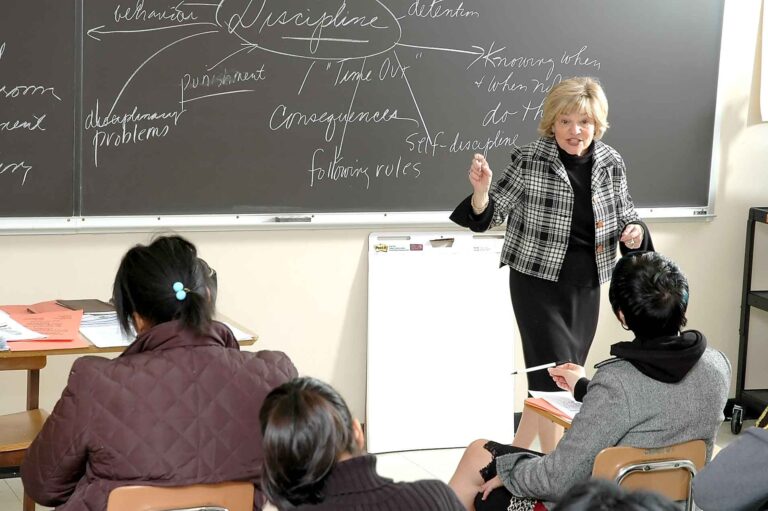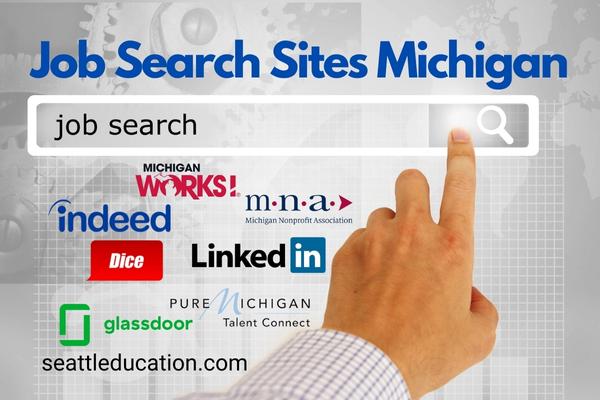Careers For Former Teachers: The Best Job For Former Teacher
As a former teacher, you may be wondering what career paths are open to you. You’ve already gained valuable knowledge and experience from your teaching job, and so the world is now your oyster! There are many options out there that can make use of this expertise – some of which might even surprise you. In this article, I will discuss various careers for former teachers who have decided to switch things up and try something new.
From tutoring to becoming an instructional designer or educational consultant, these jobs can offer plenty of opportunities for growth and income potential. Plus, they often require far less paperwork than being a full-time teacher! So if you’re looking to start anew with a different job for former teachers in education, then read on – because this article has everything you need to know about finding success as a former teacher.
Overview Of Careers For Former Teachers

Former teachers possess a wide range of skills that make them highly valuable in a variety of careers beyond the classroom. Some former educators pursue careers in fields such as instructional design, curriculum development, educational publishing, or educational technology.
Others may transition out of the classroom to roles in human resources, training and development, or management. The skills and experience gained as a teacher, including communication, leadership, organization, and problem-solving, can be applied to a diverse range of industries and professions.
With the right training and networking, former teachers can find rewarding and good fit for their career goals outside of traditional education settings.
Education Consultant
I’ve always had a passion for teaching, and I spent a lot of time in that profession. It has been rewarding to help students learn and grow in their knowledge. When I made the decision to leave the classroom, I started to wonder what kinds of great jobs I could get that would still let me use my expertise as a teacher. That’s when I discovered education consulting.
As an education consultant, or educational consultant, you work with schools and other organizations to provide instructional support. You can offer advice on curriculum development, assessment methods, technology integration and more.
My experience as a former teacher made me uniquely qualified for this type of role, allowing me to put my knowledge into practice instruction outside of the traditional classroom setting.
The most satisfying part of being an education consultant is seeing how your ideas are implemented and helping people understand the importance of quality instruction in learning environments. By taking all my prior experiences as a teacher into account, I am able to provide valuable guidance that contributes positively towards student success — something which brings me great joy.
With that said, transitioning into another field gave me the chance to explore new roles within the world of education; one such role is corporate trainer…
Corporate Trainer
As a former teacher, transitioning into the role of a corporate trainer can be an exciting opportunity. It allows you to draw on your experience in teaching and communication skills to train professionals from different backgrounds in new areas. Here’s why being a corporate trainer is such a great career choice for many teachers:
- You get to apply your knowledge and expertise. As a corporate trainer, you get to use your existing education background and experience to help others learn something new or hone their current skillset.
- You’ll gain valuable insight into other industries. Training people from various fields gives you unique exposure to those industries which can broaden your own professional perspectives and contacts base.
- You become part of the larger learning community. A big advantage of becoming a corporate trainer is that it connects you with like-minded individuals who are also committed to promoting lifelong learning within their organization as well as society at large.
Being a corporate trainer offers many advantages over traditional teaching; however, there will always be an element of instruction involved so having strong teaching abilities is essential for success! With these qualities already developed, making the transition into this role should be relatively smooth – allowing you quickly start helping others develop through learning experiences tailored specifically for them.
Moving forward, we will look at how virtual tutoring has emerged as another potential job for former teachers.
Virtual Tutor
I’m sure many former teachers have thought about the possibility of tutoring as a way to stay connected with their profession. After all, teaching is such an incredibly rewarding job – why not keep it going?
Virtual tutoring is one of the best jobs for former teachers. It offers a new and exciting option for those who want to continue working in education system but don’t necessarily may work with students and teachers in a traditional classroom setting. As a virtual tutor, you can create your own unique lesson plans that are tailored specifically for each individual student’s needs. You will be able to monitor students’ progress and provide feedback on skills they need to work on.
Additionally, you’ll get to enjoy the flexibility of creating your own schedule while earning money doing something meaningful! Virtual tutoring provides an excellent opportunity for former teachers looking to make some extra income while still connecting with their passion: teaching others.
With this type of job, you can take advantage of technology-based platforms like Skype or Zoom to reach out and want to help students around the world become more successful learners. Transitioning into advise school administration may also be another intriguing career path choice for former teachers when considering options after leaving the education field.
School Administrator

A former teacher looking for a career change may want to consider becoming a school administrator. As an administrator, you would be responsible for managing the day-to-day operations of a school.
This includes overseeing staff members, working with budgets and resources, setting goals, counseling students and parents, and representing the school in meetings with other educational organizations.
To become a successful school administrator it is important to have experience in the education field as well as excellent organizational skills. You should also possess strong communication abilities so that you can effectively collaborate with many teachers and counselors on behalf of your school district. Additionally, leadership qualities are essential since administrators manage staff members and make decisions that affect multiple people within their schools.
As educators continue to strive toward excellence in teaching and learning, there will always be room for experienced administrators who understand how best to support those efforts from behind the scenes. If you are eager to stay connected to the world of education while taking on new challenges, then being a school administrator might be just what you’re looking for!
4 Advantages of Being a School Administrator:
- Connecting With Students & Staff In A Different Capacity
- Taking On Leadership Roles
- Utilizing Organizational Skills To Create Successful Systems
- Advocating For Your School District In Meetings With Other Educational Organizations
By being mindful of these advantages when considering this career choice, former teachers can feel confident about transitioning into a role as a school administrator if they choose to do so. As such roles come with great responsibility but also lots of rewards too – including staying engaged in the ever-evolving world of education – making the move into administration could be beneficial all around!
Curriculum Developer
Making a career shift from teaching to curriculum development can be both daunting and exciting. As an experienced educator, you already have the necessary skills to succeed as a curriculum developer – creating educational programs that meet specific learning needs.
With this new role, you’ll also gain insight into corporate training initiatives and the opportunity to make an impact on how people learn in today’s digital world.
As a curriculum developer, you must understand how different types of learners will interact with your material and tailor it accordingly. You’d like to develop assessments which measure student performance and determine what areas require additional help or reinforcement.
To stay up-to-date on current trends in education, research is key; exploring innovative methods like game-based instruction or virtual reality simulations could give your work an edge over competing materials.
The most rewarding part of being a curriculum developer is watching individual students reach their potential by mastering the concepts they’ve been taught. It’s incredibly satisfying when all your hard work pays off and makes an impact!
Moving into this field requires creativity, enthusiasm for lifelong learning, and dedication to developing effective educational programs for any audience – so if these qualities fit your personality profile then becoming a curriculum developer might just be the next step in your professional journey.
From here, we move onto instructional design – another viable option for former teachers looking for meaningful employment opportunities beyond the traditional classroom setting.
Instructional Designer
I never expected to leave my teaching career and find a new way to use the skills I had acquired. But, after many years of teaching experience in the classroom, I was ready for something different. Becoming an instructional designer allowed me to do just that while still utilizing my passion for education. Here are some ways this position has helped me grow:
- Creative Outlet: As an instructional designer, I have been able to express myself creatively by designing learning experiences tailored to each audience’s needs.
- Project Manager: With every project comes multiple tasks and deadlines which means there is always something to manage and keep track of when it comes to developing materials for training programs or creating eLearning modules.
- Human Resources Liaison: My background as a teacher prepared me well for working with people from all walks of life; now as an instructional designer, I am responsible for collaborating with subject matter experts (SMEs) and stakeholders on various projects.
This role has provided me with countless opportunities that allow me to take ownership over creative projects while also problem solving any issues that may arise during production. It’s been an incredible easily transition into a field where I can continue having meaningful interactions with people while doing work that truly makes a difference in how we learn today!
Moving forward, I’m excited about exploring educational technology specialist roles within corporate organizations so that I can further expand upon my expertise in the industry.
Education Technology Specialist
I’m so glad to have discovered a career path that allows me to continue using my teaching skills and knowledge in an impactful way. Becoming an education technology specialist has allowed me to transition from the world of classrooms, textbooks, and lesson plans into one filled with innovative technology solutions for educational institutions.
As an education technology specialist I am able to work closely with students as well as other educators and school administrators. My role is often varied; sometimes I act as an educational consultant offering advice on how best to use existing technological resources within the classroom setting.
At other times I am required to develop new programs or provide training sessions on how to use various tools available online.
No matter what task requires attention, I always strive towards helping create better learning environments by utilizing digital resources. By doing this, I can make sure that children benefit the most from their time in school and that instructors have access to all the resources they need to be successful.
I’m looking forward to continue my career as an expert in educational technology so that I may assist in bridging the gap between conventional teaching techniques and contemporary technological innovation. With this transition, comes greater opportunities for both student engagement and educator growth alike.
Taking these next steps into social work will further allow me explore ways in which I can make a positive difference in the lives of others.
Social Worker

Having worked as a teacher, many individuals may feel that their experiences and skills are best suited for other professions in the educational field. One such career option to consider is social work – a job which requires excellent interpersonal skills, an understanding of how to help students and knowledge about various resources available.
To become a successful social worker, one needs to possess certain qualities including patience, empathy and compassion towards those who need assistance. They also need to be excellent communicators and problem-solvers so they can handle any situations quickly and effectively.
The following are some of the most crucial abilities a good social worker must possess:
- Ability to listen attentively
- Communication and interpersonal skills
- Knowledge of local resources
Social workers play an integral role in our society by providing support and guidance to vulnerable people or groups. It is also necessary for them to stay informed on current trends within the profession while continuously developing new great way to help those in need.
With these qualifications already established as a former teacher, transitioning into this career should come with relative ease.
Writer/Editor
Alternative jobs for teachers leaving education don’t have to mean saying goodbye to a career in education. For former teachers looking for picking a new way to apply their skills and knowledge, becoming a writer or editor is an excellent option.
As a writer or editor, you will be tasked with creating content that meets specific criteria and implementing it into various mediums such as magazines, websites, books, newspapers and more. You must have strong writing abilities along with keen editing skills if you wish to succeed in this role. Writing and editing can be extremely rewarding and fulfilling because your work has the potential to reach many audiences.
Another great way for former teachers to stay connected to their passion of educating others is by becoming a career counselor. This profession requires helping people identify job opportunities best suited for them based on their strengths, weaknesses, interests and goals.
It also entails providing advice on how they should go about pursuing these jobs through resume building and interview preparation techniques. By taking on this role, you’d be able to continue using your teaching experience while still gaining the satisfaction of helping others find success.
Career Counselor

I could not have imagined the possibilities that were available to me until I decided to explore my options as a former teacher. After years of teaching, I had developed incredible skills and knowledge in education policy; so when I learned about career counseling for many teachers, I was ecstatic!
Career counselors help educators use their talents outside of the classroom by connecting them with job opportunities that fit their abilities and interests. As a career counselor, I leverage my own experiences from teaching along with innovative strategies to guide others towards successful transitions into new careers. My work requires strong interpersonal communication and problem-solving skills to ensure clients are able to identify fulfilling jobs based on their background and goals.
Additionally, providing support and resources to individuals seeking professional development is essential for helping build self-confidence through meaningful employment opportunities. My role as a career counselor has enabled me to connect people with positions that not only utilize their past experience but also allow them to apply newfound skills within different industries.
With guidance, mentorship, and resources provided by myself or other professionals, these individuals can successfully transition out of teaching while still maintaining the same enthusiasm they had while in the classroom. This is why transitioning away from traditional educational roles does not always have to be daunting – it can be an exciting opportunity for growth and exploration! As such, I am proud and humbled to offer this service as part of my daily routine.
Nonprofit Worker
I was initially uncertain as to what my next career move should be after teaching, but then I realized that transitioning into a nonprofit worker could offer me even more fulfilling opportunities. Through this role, I can help schools and districts by providing specialist skills in areas such as fundraising, marketing, public relations and social media outreach.
Here are 4 reasons why becoming a nonprofit worker is an exciting prospect:
- Develop new professional connections – Networking with members of the community who share similar goals will open doors to collaborations and build relationships beneficial for everyone involved.
- Dive into meaningful projects – It’s possible to create initiatives that make a real difference in our communities while also developing innovative solutions.
- Gain invaluable experience – Working with nonprofits provides valuable knowledge on how organizations operate which can prove useful when it comes time to develop future proposals or programs.
- Give back – Making a positive impact on those around us is one of the most rewarding aspects of working for nonprofits; there is no better feeling than knowing we have done something truly worthwhile!
From engaging in dynamic tasks to being part of an inspiring team, there’s much to look forward to when embarking on this journey from teacher to nonprofit worker.
Conclusion
It is clear that former teachers can use their experience and qualifications to pursue a wide range of new career paths. From education consulting, corporate training, virtual tutoring and curriculum development, there are many options available for those looking to transition from the classroom into a different profession.
No matter which option you choose, it’s important to remember that having experience provides an invaluable base for any future job or venture. With dedication, persistence and hard work, you can continue your successful journey as an educator even outside of the traditional classroom setting.







